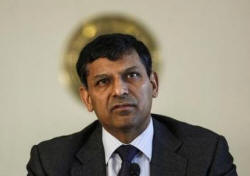|
 Central
bank governor reassures as oil spike highlights India
risks Central
bank governor reassures as oil spike highlights India
risks
 Send a link to a friend
Send a link to a friend
[June 17, 2014]
By Suvashree Dey
Choudhury and Manoj Kumar
MUMBAI/NEW DELHI (Reuters)
- India is ready to deal with any external shock arising
from the Iraq crisis, its central bank chief said on
Tuesday, even as a spike in oil prices heightens the
inflation, growth and budget risks facing new Prime
Minister Narendra Modi.
|
|
 Modi capitalised on popular anger over low growth and high inflation
to claim India's biggest election victory in three decades last
month, but it is those same troubles that now pose his first big
economic test. Modi capitalised on popular anger over low growth and high inflation
to claim India's biggest election victory in three decades last
month, but it is those same troubles that now pose his first big
economic test.
Reserve Bank of India Governor Raghuram Rajan reassured markets that
India was better prepared to deal with external shocks than last
year, when warnings by the U.S. Federal Reserve that it would scale
back its monetary stimulus hit the rupee.
"As far as the external front goes, we are in a much better position
than we were last year," Rajan said on the sidelines of an industry
event in the financial capital Mumbai.
"We have sufficient reserves, the current account deficit is low. So
I think one shouldn't worry too much about the external side at this
point," Rajan said.
The Indian rupee sank to 60.55 to a dollar on Tuesday, its lowest
since April 29, on rising crude prices and increasing geopolitical
tensions centred on Iraq.

Brent crude futures have risen by around $3 over the past week,
during which Islamic militants have taken control of tracts of
northern Iraq. The United States is considering whether to launch
air strikes and hold talks with former arch-enemy Iran to bolster
the Baghdad government. [O/R]
The RBI's dollar reserves rose to $314 billion as of May 9, the
highest since November 2011 as the central bank bolstered its
ability to defend the rupee, before falling to $313 billion as of
June 6.
IMPORT DEPENDENCE
Asia's third largest economy imports nearly 4 million barrels per
day (bpd) of crude oil - of which more than half a million bpd come
from Iraq.
Any sustained increase in the import bill would undermine progress
in shrinking the current account gap. It would also pile pressure on
Finance Minister Arun Jaitley as he prepares to present next month a
final budget for the fiscal year ending March 2015.
Through the budget and discounts, the government spends $24 billion
a year on diesel and cooking fuel subsidies. A one-dollar rise in
the oil price would add $1.3 billion to its annual subsidy bill, one
senior finance ministry official estimates.
"India has so far managed its current account well - the RBI has
added to its reserves too," said Sandeep Nanda, chief investment
office at Bharti AXA Life Insurance. "An oil price spike is a major
risk to this management."
Shares of oil companies, which usually sell off on price spikes due
to India's high import dependence, rallied on expectations that the
government would bear the brunt and that their bottom line would
benefit from its commitment to ease price controls.
[to top of second column] |

BITTER MEDICINE
Over the weekend, Modi warned he would have to administer "bitter
medicine" to restore India's economy to health. The economy is in
its most prolonged slowdown since the late 1980s, pressuring public
finances.
Jaitley has also pledged to uphold fiscal discipline, without saying
whether he would revise the budget deficit target inherited from his
predecessor of 4.1 percent of gross domestic product for the 2014/15
fiscal year.
After wholesale price inflation rose to a five-month of high in May
of more than 6 percent, Jaitley vowed to crack down on "speculative
hoarding" responsible for steep rises in prices of fresh produce.
The late onset of this year's monsoon, forecasts of below-average
rainfall, and even a strike that threatens the distribution of
onions, have stoked concerns that India could slip back into an
inflationary spiral.
Rajan said the RBI would be "vigilant" on inflation, which would
need to be watched closely for the next few quarters. The RBI now
targets consumer price inflation, which at 8.28 percent in May was
above its medium-term target.
"The government is watching the movement of rupee closely," Jaitley
said. "The slight instability of rupee is essentially because of
Iraq oil shocks and global fear of (an) oil price rise."
($1 = 59.7000 Indian Rupees)
(Additional reporting by Frank Jack Daniel, Abhishek Vishnoi,
Devidutta Tripathy and Neha Dasgupta; Writing by Douglas Busvine;
Editing by Richard Borsuk)
[© 2014 Thomson Reuters. All rights
reserved.] Copyright
2014 Reuters. All rights reserved. This material may not be
published, broadcast, rewritten or redistributed.

 |